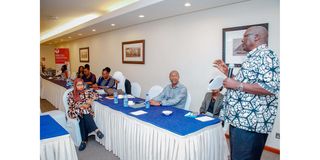East Africa celebrates milestones in haemophilia and sickle cell disease care

Former Muhimbili National Hospital executive director, Dr Lawrence Museru, addresses participants during the two-day meeting focused on uniting East African countries in the fight against haemophilia and sickle cell diseases in Dar es Salaam earlier this week. PHOTO|THE CITIZEN CORRESPONDENT
What you need to know:
- A two-day meeting, hosted by the Haemophilia Society of Tanzania and supported by the Novo Nordisk Haemophilia Foundation, marked the conclusion of a regional programme launched in 2023 to enhance blood disorder services across East Africa
Dar es Salaam. Health experts, government officials and patient right advocates from Kenya, Uganda, Rwanda and Tanzania gathered in Dar es Salaam this week to assess progress and chart the way forward to improving care for people with haemophilia and sickle cell disease.
The two-day meeting, hosted by the Haemophilia Society of Tanzania and supported by the Novo Nordisk Haemophilia Foundation, marked the conclusion of a regional programme launched in 2023 to enhance blood disorder services across East Africa.
Welcoming delegates, the former executive director of Muhimbili National Hospital (MNH), Prof Lawrence Museru, praised the power of cross-country collaboration, while Dr Stella Rwezaula, chairperson of the Haemophilia Society of Tanzania, highlighted the shared vision driving progress.
Over 660 healthcare workers have been trained through the initiative, with 28 professionals receiving specialised instruction abroad.
In Tanzania, nine now serve in seven referral hospitals.
Additionally, 23 integrated clinics were established or strengthened across the region, improving access and reducing travel burdens for families.
The programme led to the development of national treatment guidelines, while Kenya set up a Centre of Excellence for regional training.
More than 400 individuals were newly diagnosed or linked to care—74 of them in Tanzania.
Dr Kibet Shikuku of the Kenya Haemophilia Association noted that joint efforts helped countries act faster and more effectively.
Meanwhile, advocacy efforts secured public funding in Uganda and supported integration of blood disorder care into Tanzania’s health planning.
Ms Agnes Kisakye of Uganda’s Haemophilia Foundation said the progress is being felt at the community level, with patients finally “being seen and heard.”
Delegates also discussed priorities for the next two years, including expanding outreach, early diagnosis, data systems, and sustained government investment.





